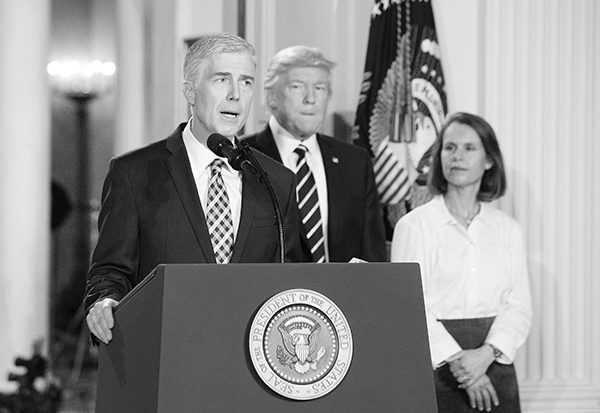On Feb. 1, President Donald Trump nominated federal appeals court Judge Neil Gorsuch to the open seat on the U.S. Supreme Court.
Before this nomination, I looked at the list of other candidates: William Pryor, Raymond Gruender, Diane Syke — all conservative and ready to bolster Trump supporters’ faith in his administration. I also considered the rest of Trump’s growing administration, a few unqualified (Betsy DeVos) and unreliable (Sean Spicer) mixes in the bunch that really made me believe that every subsequent addition would be not only questionable, but aggravating.
It’s no surprise, then, that Gorsuch is a conservative judge who’s going to concern liberal groups. Trump chose someone whose political history aligns with his own.
I wish I could say I’m antagonistic towards Gorsuch like I am with most of Trump’s decisions, but I’m not. The judge leans unsurprisingly right on the political spectrum, but according to previous court case decisions, he’s not an extremist nor does he lack the political qualifications of becoming a Supreme Court Justice.
Still, one substantial problem is that his originalist interpretations of the Constitution can undoubtedly aid Trump’s goal of taking us fifty years back into the past. I’m not saying that because I lean toward more liberal perspectives on political issues, either; his originalist stance indicates he interprets the Constitution verbatim. He reads it by how it was meant when it was adopted, as opposed to what the court can interpret it to mean. Without taking into consideration contemporary culture, he risks damaging the rights gained by women, people of color, LGBQT+ and other marginalized peoples.
Originalism can be dangerous. It doesn’t take into consideration a world of advanced telecommunication and international relations. It relies instead on a draft of clauses written for a country with a lack of diversity and occupations. Business Insider writer Michelle Mark offered an example where the judge visually diagrammed a sentence during a court case to show how dedicated he was to the word-for-word reading of the law. “Gorsuch is a clear adherent to textualism — a manner of interpreting laws in accordance with their plain text, rather than by assuming or inferring the intent of lawmakers, or the potential consequences of the laws’ implementation,” Mark said.
One of these potential consequences reaches into his commitment to constitutional religious freedom. In Hobby Lobby Stores, Inc. v. Sebelius, he sided with the ruling that the Department of Health and Human Services did not have to provide contraceptives, a provision that was part of employees’ insurance plans, if those companies were secular. He preserved those companies’ religious beliefs at the expense of individual’s liberties. As a Supreme Court Justice, if the ruling of Roe vs. Wade were to resurface due to, say, some very passionate Trump supporters ready to have the “improved” Supreme Court take another look at it, issues concerning women’s rights to their own bodies will escalate.
Another problem with Gorsuch as the new addition is the result of a heavy right Supreme Court that could grant Gorsuch and his conservative cohort a potential future of overturning a variety of legislation. Much of it could affect marginalized groups if it confronts conflicting topics like same-sex marriage, police surveillance, immigration, etc. It could also dictate financial plans in politics, gun rights and climate change research — which Trump has already denounced and defunded.
If he is adamant on conserving religious freedom through anti-reproductive legislation, I hope Gorsuch will be able to discern the irony in banning something like Planned Parenthood for the sake of certain groups — who may or may not have a religious affiliation of some kind. Compared to the rest of the other nominees, Gorsuch seems just as conservative as any other judge, and quite frankly, I think we’re better off with him than some rightwing extremist.
Democrats in the Senate disagree; Trump ignored former President Barack Obama’s nomination of Judge Merrick Garland for the empty Supreme Court, leaving the Democratic Senate with an unfavorable nominee. It’s obvious that a president who has the chance to assign someone to this position is looking for not only the presumed interests of the country, but also to ensure that any future proceedings that his party is affiliated with has an advantage. I disagree with much of Trump’s agenda, but he has definitely used his first two weeks efficiently, in this sense, by developing and passing a plethora of executive orders — so Gorsuch may be fundamental in tilting court decisions to the right.


